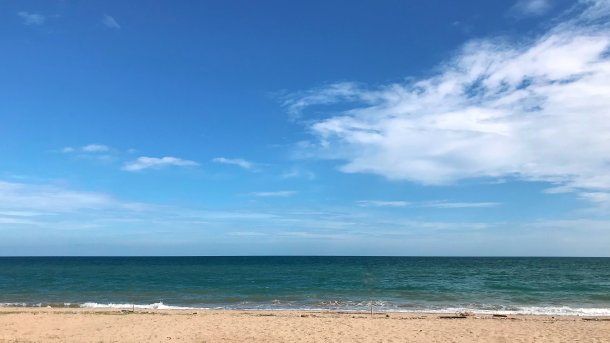Greece checks compliance with beach rules using drones
Greece uses drones to protect beaches from illegal use. An app also lists legal providers and is used to report violations.

Beaches are to be better protected by restricting commercial use.
(Image: pancha.me/Shutterstock.com)
Drones are increasingly patrolling Greece's beaches to monitor compliance with beach rules, in particular the commercial use of beach areas. The Greek government had already announced the measures at the end of May 2024 and explained them on Tiktok. An app will also indicate legal offers. It can also be used to report violations, reports Metro.
The drones will be used to inspect beaches where restaurants, bars and rental companies have set up sun loungers and deckchairs for which no permits have been issued. The drone inspections are mainly targeting sections of beach that are protected. The necessary regulations were issued by the Ministry of Economic Affairs and Finance back in March. The measures were then announced at the end of May.
New beach rules
The regulations state that beaches in Greece must remain 70 percent free from use as sunbeds, and 85 percent in protected areas. Construction has also been severely restricted in these areas. Operators of sunbathing areas who want to use beach areas and rent out sun loungers, for example, must obtain a permit to do so. These can be acquired via online auctions.
The acquisition of such a permit comes with obligations for the operators. Seating, sun loungers and parasols must be located at least four meters from the seashore. The use of beach sections less than four meters wide is therefore not permitted. Operators must also ensure that the beach is kept clean and that the beach section is accessible. This can be done by means of suitable signage, for example. In addition, they must employ a lifeguard who is permanently present during commercial usage times.
Videos by heise
Beach inspections with drones
The inspections are carried out using hand-operated drones; they are not autonomous. In principle, all beaches on Greece's coasts are to be monitored. The drones are currently patrolling 14 Greek beaches on the north-west coast, Lagonisi and Nea Heraklia beaches in Halkidiki, Klima beach on the island of Aegina and Masouri on Kalymnos. Beaches at popular tourist destinations such as Rhodes and Corfu are also being monitored.
A number of fines have already been imposed. The highest fine was for a company that illegally used a section of Thymari beach in Anavyssos, south of Athens. The company alone had to pay 220,000 euros.
As a further measure against illegal beach use, the Greek government is using the smartphone app MyCoast. It lists facilities that operate legally on the beach. It can also be used to report illegal beach use. The government hopes that these measures will protect Greece's beaches from excessive tourist use.
(olb)